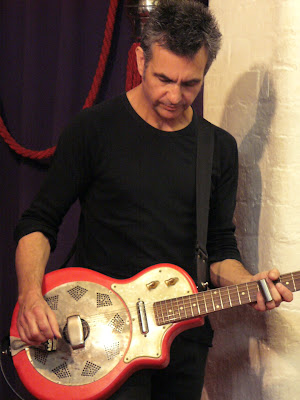 I've just read The Road by Cormac McCarthy. It recently won the Pulitzer Prize and it surely deserves the accolades it has been receiving.
I've just read The Road by Cormac McCarthy. It recently won the Pulitzer Prize and it surely deserves the accolades it has been receiving.
I was a bit late getting around to reading The Road, and now having done so, I feel haunted by the novel. It's certainly very bleak, but there is a light shining through the grey landscape of the book, in the relationship between the father and his child. The father keeps telling the child "we're carrying the fire". It is a brave cry of hope and decency in a brutal world that impresses itself on the son. The book is very easy to read - I whipped through it in a couple of hours - the writing style being very simple and stark like the landscape. There is a total lack of sentimentality but you end up being very moved by the story, emerging from the novel with a sense of having journeyed somewhere strange and frightening and chillingly possible.
I was interested to read a comment by Michael Dirda, book reviewer for the Washington Post, about The Road. He recommended reading Russell Hoban's wonderful post apocalypse novel Riddley Walker and also The Mouse and his Child as well as/along with The Road.
The Road actually reminded me most of all of The Mouse and his Child, and though the latter is a quite different book, the relationship of the mouse father with his child strikes a chord when reading The Road.
Many years ago (in the 1970s) when I worked in a Science Fiction bookshop called Space Age Books, I wrote a review of it for the shop's monthly catalogue/newsletter. My review caused The Mouse and His Child to become a best seller for the shop. Some years after I had written the review, I met Russell Hoban in person and he kindly signed my copy of the book (he'd heard about my review!). My edition of The Mouse and his Child is an old Faber paperback published in 1972. Russell Hoban signed it on 16 March 1984.
Anyway, below for your delectation is my review:
THE MOUSE AND HIS CHILD
Russell Hoban (Pictures by Lillian Hoban)
 This novel has been hailed as one of the most brilliant books to emerge in recent years. I would certainly agree, and although I cannot hope to do it justice within the scope of this review, here goes :
This novel has been hailed as one of the most brilliant books to emerge in recent years. I would certainly agree, and although I cannot hope to do it justice within the scope of this review, here goes :
THE MOUSE AND HIS CHILD is a story of extraordinary quality and richness, a haunting and moving story of two clockwork mice - a mouse father and his child - forever linked by their clockwork design and mechanism; the child forever doomed to walk backwards, his father forever dependent on outside assistance for them to move at all.
Originally designed to dance in a circle, the mouse and his child eventually break and are thrown out as obsolete toys. A passing tramp partially mends them, so they can at least move forwards, and they are thrust into a cruel and violent world, falling into the hands of Manny Rat, crime king of the rubbish dump - mechanical wizard and exploiter of all unfortunates - an extremely nasty customer. From then on the mouse and his child are driven by fate through a number of strange and often terrifying adventures.
The mouse child is perhaps the most memorable of all the characters, for he possesses a dream and a quest, and somehow his dream affects everyone he encounters, and each character finds himself bound up and inextricably linked to the fate of the mouse and his child. Throughout the book the mouse child never loses the quality that is essentially his - an innocence and absurd optimism that never in any way becomes tarnished, but only grows deeper and more enriching to the creatures who befriend him.
Besides the mouse and his child there is an astonishing array of unusual characters, ranging from the despicable Manny Rat through to the clairvoyant Frog, the philosophical Muskrat, C. Serpentina, the poetic turtle - author of an outrageously surreal play called THE LAST VISIBLE DOG - and the microscopic Miss Mudd, who helps the mouse child and his father solve the problems posed by the aforementioned play.
THE MOUSE AND HIS CHILD is a most unusual book that deserves to be more widely known. It has the quality to enrich your lives ... as well as your bookshelves.
 Yet another fine lunchtime performance today at Basement Discs in the person of Chris Wilson, with Shane O’Mara providing superb guitar backing to Chris’s vocals and harmonica.
Yet another fine lunchtime performance today at Basement Discs in the person of Chris Wilson, with Shane O’Mara providing superb guitar backing to Chris’s vocals and harmonica.






.jpg)
.jpg)




